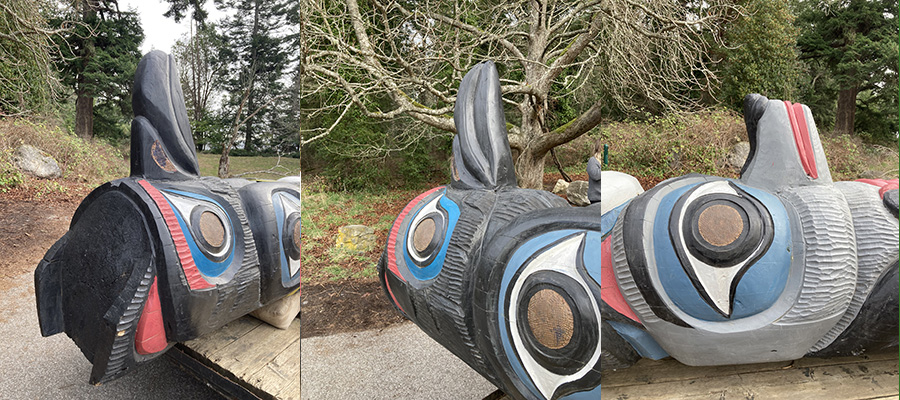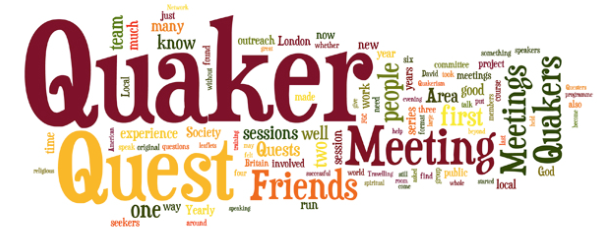||| FROM ANITA HOLLADAY |||
On Thursday, March 9, Orcas islanders responded to the invitation and gathered at the end of Haven Road in Eastsound, at the entrance to Madrona Point, to view a new totem pole and hear from the House of Tears carvers, people from the Lummi Indian Nation who once again are setting out on a journey in solidarity with a group of Land and Water Protectors. The carvers have visited Orcas previously, a few times, with totem poles created in defense of sacred sites and important causes. This journey is in support of the effort to save Oak Flat, or Chi’chil Bildagoteel in the Western Apache language, a site that is of particular sacredness and cultural significance to the San Carlos Apache Tribe and other tribal nations in the region. It is located near Superior, AZ, about 60 miles east of Phoenix. The destruction the tribes are hoping to save the land from is a gigantic copper mine that would devastate the area.
The immediate focus of the totem pole journey, as the group travels through Washington, Oregon, and California, to garner support and gather groups in prayer for the mission’s success, is an en banc hearing at the 9th Circuit Court of Appeals, in Pasadena, CA, at 10 a.m. on March 21. The court case represents the opportunity for Apache Stronghold, the group of native people and their allies that opposes the mine, to appeal their case, a suit against the U.S., to the entire group of eleven judges of the Court of Appeals, after a ruling against them was delivered in a split decision by a 3-judge panel in June 2022.
The primary speaker at the Madrona Point event, which later shifted to the Orcas Island Library for a slide show depicting previous totem pole journeys, was Freddie Lane, also called Sul ka dub. Master carver Se Sealth/Jewell James was not in attendance, but the other primary carver,
Sit ki kadem/Doug James was in the group, along with Siamel’wit, a woman who carried an eagle head staff around the large circle of participants to be touched with their prayers for the journey and the cause. After this, the attendees gathered close to reverently touch the totem pole, as the invitation was given for any “ministers” in the group to offer a prayer in their own
way.
The pole itself, primarily black with accents of red, blue, and white, with hammered copper disks for the creatures’ eyes, represents an orca whale diving into the Salish Sea, above that a coyote, and at the top, a raven, the latter two considered trickster figures in the stories of the northwest peoples. It rested on a flatbed trailer, pulled by a van. Posters on the trailer detailed the route of the journey, which had begun in late February with a circuit of a dozen towns and tribal nations around the Salish Sea, and the planned route of ceremonies along the west coast, with arrival in Pasadena planned for March 19, where the caravan will converge with the Apache Stronghold group now en route on their own ceremonial journey from Arizona to Pasadena for the court date on the 21st.
For the rest of March, the House of Tears Carvers will bring the pole east through California and Arizona to be at the Oak Flat site for prayers on March 24–25, then make their way back through New Mexico, Nevada, and Idaho to reach their home at the Lummi Nation by April 1. The group also invited interested people to visit them during a Gathering of the Eagles, an event May 21–29 which will see canoe families pass through the San Juan Islands and culminate in several days of celebration at the Lummi reservation near Bellingham.
Much information on the history of the Oak Flat mining issue is available online, so I will refer readers to the internet for in-depth information about the issue, which I’ll summarize below. However, a new development since the journey began is the introduction on March 3 of a bill in Congress by Representative Raúl M. Grijalva (D- AZ), the ranking member of the House Natural Resources Committee, the “Save Oak Flat From Foreign Mining Act,” that would permanently protect Oak Flat, in the Tonto National Forest, from the destruction of it’s tribal cultural and religious heritage sites. Regardless of the outcome of the court case, it seems that publicizing the bill with the goal of pressuring legislators to pay attention to it would be an important step. The bill has the support of several co-sponsors as well as too many environmental, tribal, and religious organizations to list here.
The backstory of the issue is that the proposed mining of the area has been controversial since at least 2002; as of 2012 Resolution Copper had spent over a billion dollars and by this year, nearly 2 billion dollars in preparation for the mining project. in December 2014, an irrelevant “midnight rider was inserted into the must-pass National Defense Authorization Act to mandate the public land transfer of the Oak Flat area to Resolution Copper for proposed copper mining operations.” With this rushed and un-reviewed land swap, Resolution traded some scattered parcels, of more area but less value, to the state of Arizona in exchange for the Oak Flat parcel which contains billions of dollars worth of copper, and would be mined for a planned 60 years.
Resolution Copper is co-owned by two of the world’s largest mining corporations, BHP and Rio Tinto; the latter’s “majority shareholder is [a holding company for a government commission of] the People’s Republic of China.” There has already been much protest in the past several years; Grijalva has introduced bills to Save Oak Flat a few times previously; and in June 2022, two judges on the three-member 9th Circuit Court of Appeals mentioned above ruled against the Apaches cause. The Trump administration, in January 2021, rushed through a flawed EIS (environmental impact statement) which has been rescinded by the Biden administration, but the land currently remains the property of the mining company, with a new EIS remaining to be completed.
The appellate court proceeding taking place next week on March 21 could be a last hope to stop a mine that would be disastrous not only for the tribes, but “would drain Arizona’s water resources at a time of extreme drought, contaminate local groundwater, and cause irreversible damage to the area’s natural attractions,” which include a world-renowned rock-climbing area and beautiful scenery. The mining proposed is a method called block cave mining, apparently unprecedented on this scale, which would drill about 1000 feet deep and collapse the entire area into a nearly 2-mile-wide crater, from which the small percentage of copper would be extracted and a mountain of tailings be left onsite, contaminated with the chemicals used to extract the copper, requiring a dam 60 stories high to contain the liquid component of the tailings, that could spread pollution for hundreds of miles if it were ever to break. In this writer’s opinion this is a mine that should be opposed with the vehemence with which the, finally and recently, dis-approved Pebble Mine in Alaska was opposed. (Quotes are from the House Natural Resources Committee website.)
The Facebook page for the House of Tears Carvers journey is “Our Shared Responsibility: A Totem Pole Journey.” There is a post with a donate button, however, you can also scan the QR code of one of the posters on their site to be taken to their donation page on website of the sponsor org, Catskill Mountainkeeper. Donations support the carvers’ journey. The Facebook page with current updates on the Apache journey is “Apache Stronghold/Save Oak Flat.” There is also a website, www.apache-stronghold.com. The /take action webpage has donation links, t-shirts and signs to support the cause, easy ways to contact Congress, suggestions for letter writing, and more. Donations support the Apache Stronghold journey. The website for the new congressional bill is at the website for the Democrats House Natural Resources Committee. (If not following link, search under Save Oak Flat)
A 12-minute video from 2020, The Fight for Oak Flat, is available on Vimeo and was sponsored by Arizona chapters of the Sierra Club. Also from 2020, local reporting in an AZCentral.com article details the fight that was taken to a congressional subcommittee that year.
The website of Becket , the law firm representing Apache Stonghold in the appellate court proceedings has a lot of information about the case.
Wikipedia has articles under both Oak Flat (Arizona) and Resolution Copper .









Thank you so much, Anita, for this very comprehensive article. The mining process you describe has got to be one of the worst perversions of our Earth, let alone that this is on sacred Apache land. Stopping this mine is a cause well worth supporting.